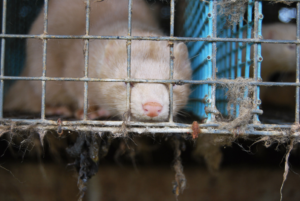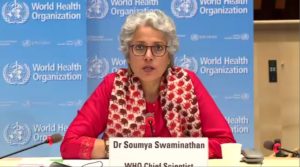
There is so far no evidence that the outbreak of mutant SARS-CoV-2 virus strains exploding in Danish mink farms threaten the development of a successful COVID-19 vaccine, said top World Health Organization (WHO) officials on Friday.
More than 200 mink farms in Denmark have reported cases of SARS-CoV-2 infections, prompting Denmark’s prime minister, Mette Frederiksen, to order a cull of virtually the country’s entire farmed population of 17 million mink.
In a press conference Thursday, Frederiksen described the virus mutations as posing a “serious risk” to the development of a vaccine and to global public health. Denmark is the largest producer of mink fur in the world, exporting primarily to China and Hong Kong.

WHO Chief Scientist Soumya Swaminathan sought to allay fears that the mutant variants posed a threat to the COVID-19 vaccines that are likely to come on the market early next year: “We don’t have any evidence at the moment that it would [impact vaccine efficacy].”
“It is too early to jump to conclusions as to the implications of these specific mutations,” Swaminathan added. “WHO is leading a group of evolutionary biologists and bio thematic experts that are tracking these mutations, and we have seen plenty of them.”
Variations of the SARS-CoV-2 virus isolated from mink have mutated spike proteins, according to Denmark’s State Serum Institute. The institute confirmed that multiple mutations in the spike proteins – a distinctive feature of the SARS-CoV-2 virus, allowing the virus to easily penetrate animal and human cells – had been isolated from infected mink samples.
These spike proteins have also been key targets for various vaccines now under development, including those by Pfizer, Moderna, Johnson&Johnson and AstraZeneca, all of which aim to stimulate immune system recognition of signature spike protein features and mount a response.
[huge_it_slider id=”15″]At a WHO press conference on Friday, Dr Michael Ryan, Executive Director of the WHO Health Emergencies Programme, said: “This type of thing happens all the time. This is a global pandemic and millions of people are affected and many animals have been exposed.”
“There is a potential that the virus could come back to humans,” he added, referring to the need to increase security and surveillance on farms and to monitor viral evolutions. “Right now, the evidence that we have does not suggest that this variant is in any way different in the way it behaves.”
He clarified that while it may have a “slightly different signature”, it is still the same virus. The variant must be evaluated over time to determine if that variant also will impact the dynamics of viral transmission and immune response.
Fears of an Ineffective Vaccine are ‘Idiotic’
This is not the first instance of coronavirus being detected in farmed mink. News of the virus infecting mink was first reported in the first wave of the virus in the Netherlands over the spring and in June, 90,000 mink were culled in Aragon, Spain.
However, while the circulation of the virus among new animal populations heightens the risks that transmission can resume, even if it is interrupted, experts said that it was irresponsible to suggest that the virus mutations seen so far could be resistant to the vaccines under development.
Professor Francois Balloux, director of the University College, London Genetics Institute, tweeted that reporting vaccine development is at risk is “completely irresponsible” and problematic, writing that the, “scare story is just idiotic.”
He clarified that while “vaccine-escape mutations” may or may not arise in humans, they definitely would not be fuelled by variations emerging in minks.
Pandemic-Based Urge for Illicit Animal Trade Restrictions
Meanwhile, a new World Trade Organisation (WTO) report highlights how the global trade in animals and wildlife is a factor driving the risk of zoonotic disease spread, increasing the likelihood of other pandemics, such as COVID-19.
In its report, entitled Future Resilience To Diseases of Animal Origin: The Role Of Trade, WTO underlined that illicit trade, in particular, needs to be better managed and that WTO members have a right enshrined in existing WTO rules to protect their countries health systems by regulating such trade.
Nearly 3 million human deaths each year are caused by more than 50 zoonoses – even before the pandemic occurred – the report estimates. Additionally, 20% of livestock production is lost due to animal diseases annually, an estimated loss of US$ 300 billion.
The report stressed that more effective action requires greater collaboration between WHO, the World Organisation for Animal Health (OIE) and the Food and Agriculture Organization of the United Nations (FAO), in collaboration with the WTO to control the trade in wild animals, in particular – although it stops short of recommending an action plan.
The report makes only one oblique reference to the recent COVID-19 outbreaks in mink farms, otherwise stating that:
“In the case of domestic or farmed animals, disease outbreaks are monitored and controlled, depending on the capabilities of veterinary authorities and other related actors at the national level. Large volumes of trade in animals and animal products take place safely, following international standards and national requirements. This limits chances to detect and report diseases in wildlife, and to collect data and knowledge, which are key for the management and control of such diseases.”
Of greater concern is unregulated and illicit trade of animals, where there is no similarly close surveillance of wildlife:
“Unregulated or illicit trade in animals – whether farmed, domestic or wild – implies a higher risk of spreading disease. Since the outbreak of the pandemic, some experts and international institutions have called for closer controls, in particular of trade in illicit wildlife, given that such trade does not necessarily respect existing sanitary requirements, and thus undermines government’s efforts to prevent disease transmission.”
WTO referred to calls made earlier in the pandemic by The Lancet and the UN Environment Programme for tighter controls of illegal wildlife trade. The report stops short however of providing clear cut recommendations about how trade rules could be tightened.
COVID-19 is the worst outbreak in recent history of a zoonotic disease – a disease originating in animals and transmitted to humans – but the pandemic has underscored how interrelated human health, global food security, worldwide nutrition and animal health are.
While some arguments for domestication and wild animal consumption may at least have a nutrition aspect, mink today are raised and sold almost exclusively as a prestige item for the fashion industry, raising questions among animal rights activists and environmentalists about why such trade should even exist.
Image Credits: Nettverk for dyrs frihet / Net. for Animal Freedom.
